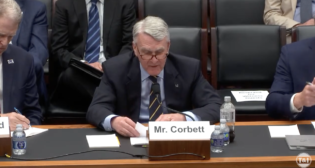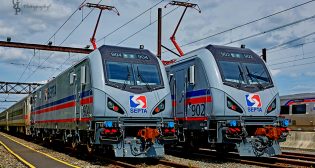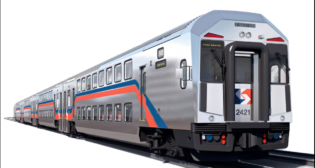
Does the emperor wear no clothes?
Written by M. E. Singer
Amtrak President and CEO Richard Anderson. Photo courtesy Scott Eells/Bloomberg via Getty Images
With no panache in any prior media announcement, nor even a tip-off to its diehard advocacy supporters, Amtrak launched on June 20 a unique sale of roomettes through only June 26, and good for travel between Aug. 20 and Feb. 15, 2019 (https://www.amtrak.com/roomette-sale-buy-one-get-one-free). Based upon the prior atmosphere of Amtrak and certain airlines, this surprise sale actually gives the impression of simmering issues behind the iron curtain of transparency deep within the Amtrak bunker.
How can the timing of this sale be explained, since it comes when the prime summer travel season is already in full swing? Certainly the end of August through mid-September is still prime season. Other than a Thanksgiving blackout, what about the peak winter travel period of three weeks over Christmas and New Year’s being open and available for this sale?
Frankly, I sense this ad is Amtrak’s “the canary in the coal mine.”
Historically, we have witnessed transportation firms revise their business model to jump-start sales when strapped for cash and banking on working the cash flow simply to survive. This happened with People’s Express Airlines, and repeatedly with Amtrak in the past when it was running short on funds prior to its Oct. 1 new fiscal year. Given the lack of any real restrictions and length of this sale, this is eerily reminiscent of Amtrak’s modus operandi to rely upon the cash thrown off from the long-distance trains during the summer months to hold on until Oct. 1.—a true irony given corporate Amtrak’s attitude toward the long-distance routes, and its clever allocation of costs against those routes. This only proves the actual viability for the long-distance routes, and their durability to apparently carry the entire system for almost a quarter.
Dissecting Amtrak’s ad identifies several salient points. There is no mention of dining services, or even meals (that has to be a first). Despite completion of repairs at Penn Station New York in September, Chicago-New York and Chicago-Boston routes are omitted from sample destinations.
Also, should we infer from this unexpected sale thrust upon us that the market has definitively reacted to the continuous negative publicity Amtrak generated this year threatening the long-distance trains by further denigrating dining services, questioning the sustainability of long-term life of those routes, while arrogantly bumping sleeping car pricing astronomically between market segments lacking competitive alternatives?
In essence, despite ignoring GAAP by playing a “shell game” with PRIIA revenues and National Network funding to subsidize the Northeast Corridor, due to the lack of accountability, oversight and transparency by Amtrak’s Board of Directors, we do not have the details to know to what extent Amtrak is now “flying at night in the fog and rain on instruments, with the instruments turned off.” If so, Congress should demand Amtrak to immediately open its books for a comprehensive audit by a reputable third-party accounting firm; to open up its dark vault how it allocates costs, funding and revenues.
Perhaps this sale will indeed be “the canary in the coal mine” to require Congress to institute an acceptable business model within Amtrak to embrace accountability, oversight and transparency. In respect to those issues, Congress should start an intensive review to re-structure, or, simply eliminate, PRIIA, which is unsustainable as it only serves as a subsidy for the NEC. Nor should it be deemed acceptable for Amtrak’s interpretation of PRIIA to force states to pay for infrastructure improvements, since Amtrak alone has defined whether or not those routes are sustainable.
 M. E. Singer is an observer and commentator on the passenger rail industry, identifying shortfalls and growth opportunities. He is currently Principal at Marketing Rail Ltd. in Chicago, a consultancy to achieve passenger rail customer experience and product branding. Singer has prior corporate experience in turnaround operations management, marketing, and mergers and acquisitions in the health care field.
M. E. Singer is an observer and commentator on the passenger rail industry, identifying shortfalls and growth opportunities. He is currently Principal at Marketing Rail Ltd. in Chicago, a consultancy to achieve passenger rail customer experience and product branding. Singer has prior corporate experience in turnaround operations management, marketing, and mergers and acquisitions in the health care field.



